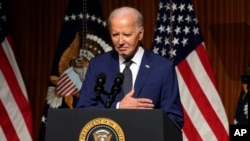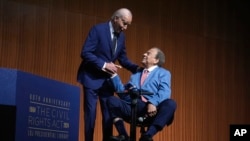No longer on the campaign trail, President Joe Biden on Monday delivered a speech at the LBJ Presidential Library designed to help cement his legacy.
Slightly more than a week after dropping out of this year's election campaign, Biden marked the 60th anniversary of the Civil Rights Act by speaking out for the rule of law and democratic principles. All the while, he warned about the threat he sees if Republican Donald Trump returns to the White House.
“No one is above the law,” Biden said.
Biden followed his denunciations of Trump with a mix of nostalgia for his early days in politics during the era of Martin Luther King Jr., John F. Kennedy and Lyndon B. Johnson.
It’s a story he’s told before, about how he became a public defender and was cornered by Delaware leaders to run for the U.S. Senate. But it’s taken on a new resonance as he stares down the final six months of his political career.
“Because I got engaged like a Iot of you do ... you get engaged and you want to change things,” he said.
The setting carried a special resonance. Biden spoke at the library dedicated to Johnson, the last president who opted against seeking reelection, just as Biden did.
Supreme Court changes
Biden also used his speech to call for changes to the Supreme Court that include term limits and an enforceable ethics code for justices, as well as a constitutional amendment that would limit presidential immunity. But his proposal is unlikely to clear a Republican House, leaving Biden to take a symbolic stand for the causes to which he has devoted his time in public office.
The Texas visit took on very different symbolism in the two weeks it took to reschedule it after Biden had to cancel because he got COVID-19.
The speech, originally set for July 15, was once seen by the White House as an opportunity for Biden to try to make a case for salvaging his sinking presidential campaign — delivered in the home district of Representative Lloyd Doggett, the 15-term congressman who was the first Democratic lawmaker to publicly call for Biden to step aside.
Two weeks later, the political landscape has been reshaped. Biden is out of the race. Vice President Kamala Harris is the likely Democratic nominee. And the president is focused not on his next four years, but on the legacy of his single term and the future of democracy.
Doggett was among the group of lawmakers, civil rights advocates and others who greeted Biden after the president landed Monday in Austin. Biden and the Texas congressman shook hands and spoke briefly.
Biden called Harris in his speech an “incredible partner” who will “continue to be an inspiring leader.”
Latest exit
No American incumbent president has dropped out of the race as late in the process as did Biden. Johnson announced he would not seek reelection in March 1968, at the height of the Vietnam War.
Biden has drawn a lot of comparisons to Johnson of late. Both men spoke to the nation from the Oval Office to lay out their decisions. Both faced pressure from within their own party to step aside, and both were ultimately praised for doing so.
But their reasons were very different. Johnson stepped away in the heat of the war and spoke at length about his need to focus on the conflict. Biden, 81, had every intention of running for reelection until his shaky June 27 debate performance ignited fears within his own party about his age and mental acuity, and whether he could beat Trump.
Biden has called Trump a serious threat to democracy, particularly after the ex-president's efforts in 2020 to overturn the results of the election he lost and his continued lies about that loss. The president framed his decision to bow out of the race as motivated by the need to unite his party to protect democracy.
“I’ve decided the best way forward is to pass the torch to a new generation. That’s the best way to unite our nation,” Biden said in his Oval Office address. “Nothing, nothing can come in the way of saving our democracy. And that includes personal ambition.”
During his presidency, Biden has often put equity and civil rights at the forefront, including with his choice for vice president. Harris is the first woman, Black person and person of South Asian descent to have the job. She could also become the first woman elected to the presidency.
Equity actions
Biden's administration has worked to combat racial discrimination in the real estate market. He pardoned thousands of people convicted on federal marijuana charges that have disproportionately affected people of color. His administration has provided federal funding to reconnect city neighborhoods that were racially segregated or divided by road projects, and also has invested billions in historically Black colleges and universities.
His efforts, he has said, are meant to push the country forward — and to guard against efforts to undermine the landmark legislation signed by Johnson in 1964, one of the most significant civil rights achievements in U.S. history.
The law made it illegal to discriminate on the basis of race, color, religion, sex or national origin. It was designed to end discrimination in school, work and public facilities, and it barred unequal application of voter registration requirements.
Johnson signed the act five hours after Congress approved it, saying the nation was in a “time of testing” that “we must not fail.” He added: “Let us close the springs of racial poison. Let us pray for wise and understanding hearts. Let us lay aside irrelevant differences and make our nation whole.”
Biden has said he is “determined to get as much done” as he can in his final six months in office, including signing major legislation expanding voting rights and a federal policing bill named for George Floyd.
“I’ll keep defending our personal freedoms and our civil rights, from the right to vote to the right to choose," Biden said from the Oval Office. “I’ll keep calling out hate and extremism, make it clear there is no place, no place in America for political violence or any violence ever, period.”
Later Monday, Biden will also travel to Houston to pay his respects to the late Representative Sheila Jackson Lee, who died July 19 at age 74.






